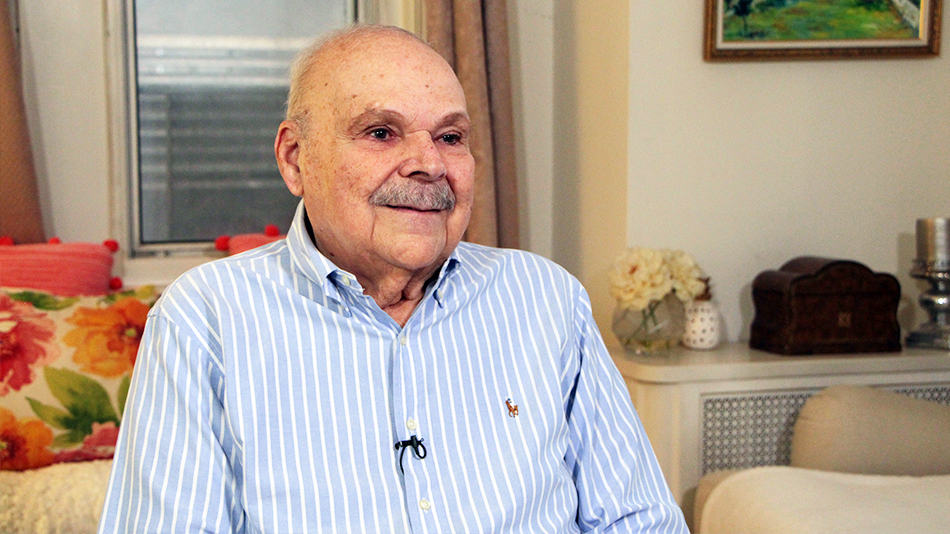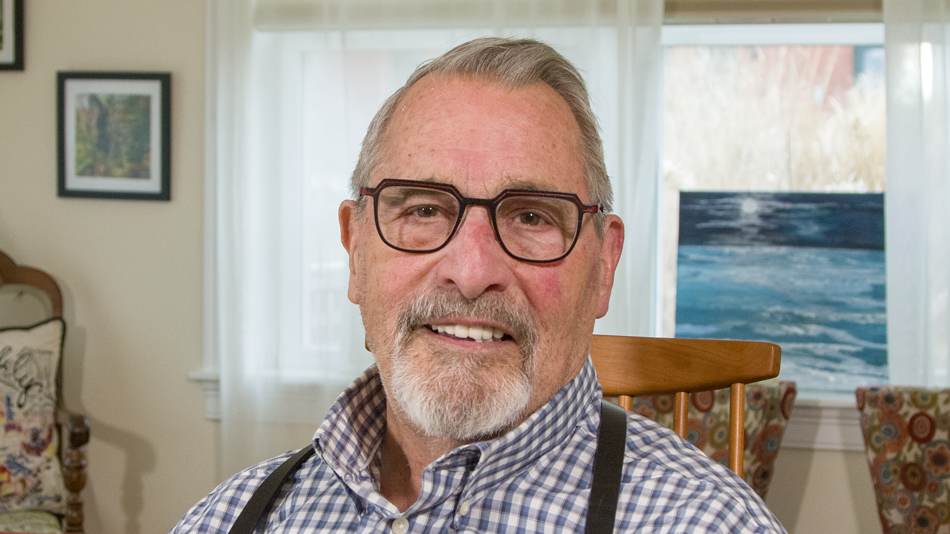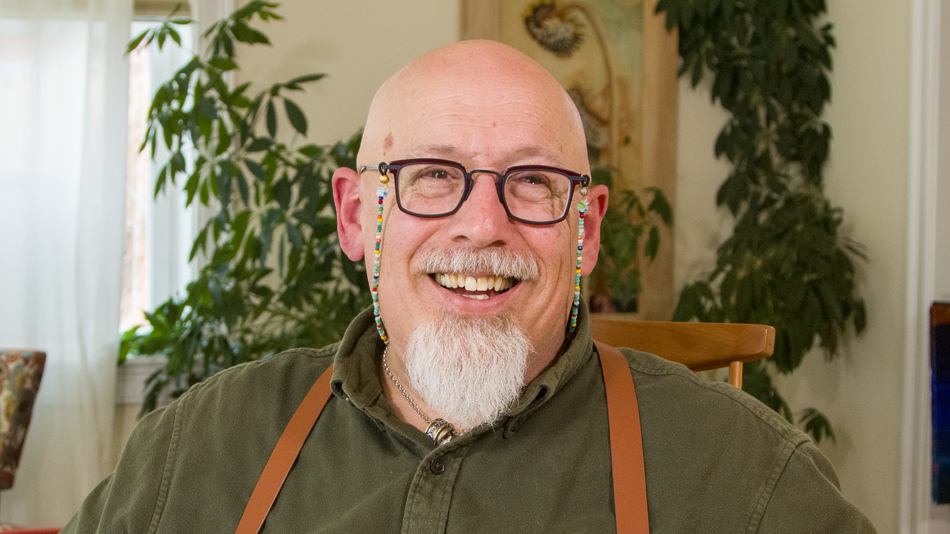
1947: Meeting Other Gays in High School: “It Was Something I Wanted To Be A Part Of.”
My life actually started in early September of 1947. That was when I started my first day of high school. It was a day of nerves but I managed to get through it. But the second day, we were to select clubs. And I had already seen my first Broadway show, which was trying out in Philadelphia, I saw it the previous year. It blew my mind and I immediately fell in love with theater, so I chose the drama club.
While we were just sitting around talking between rehearsals, one of the seniors who had been the star of the previous year’s musical, Cinderella Sue – he was Sue. And he came over to me and he said, “You’re so gay.”
And I said, “What’s that?” I had a very sheltered early life. He proceeded to tell me and show me. And he introduced me to his friends, he introduced me to gay life outside of school. In those days, if you were under age, there was a group of kids that hung out in Rittenhouse Square, which is pretty famous. And it was a cruisy place at the time. And we just hung out there and we kibitzed. We just had good times and we – some of them were extremely funny, outrageously funny, and some of them were bitchy.
We did that for quite a while. A couple years. And then I started not to see so much humor in it. There were – at that time, some queens were very – some queens were bitchy. Some queens were evil. We only used first names because the evil queens frequently got your, if they took a dislike to you, took your – got your first name – your last name – and outed you to your parents. And that did not sit well with me. And so I thought that that was not the kind of person I wanted to be associated with.
Meeting the group in Rittenhouse Square and other places that Charlie had taken me, it changed my life because I didn’t know that those things of that existed. I didn’t know – I had no idea what the gay meant or connotated. I just – I learned it by traveling with him and seeing what it meant. And it was something I liked and something that I wanted to be a part of.
1948: Father Sends Gay Son To Two Psychologists.
At the age of 16, which would been in 1948, my father suggested that I see a psychologist. There’s actually a pediatrician whose practice was just down the street from us and he suggested that I might have something I want to discuss with him. Maybe I had some questions I wanted answered. And so if it was alright with me, he would make an appointment.
And I said, “Sure, that’s fine.” Made the appointment and went there. He called me in, introduced himself, was very pleasant, very nice, had a good manner.
And he said, “I understand that you may have some problems that are bothering you and you might want to discuss them with someone. Is there something you’d like to discuss with me?”
And I said, “Well, um, not really.” I said, “But there is one problem and that is that I’m homosexual, and I think that my father is having a difficult time handling it.” And I can’t remember the conversation after that, but I never had to go back.
But about a year later, he suggested another psychologist who was – who worked out of the Jewish Family Service in Center City here. I agreed to go talk to them. And he said – I kept the appointment and he said that, “I’m actually speaking to your entire family but individually.” He again asked what I would like to discuss. My father had mentioned that I might have issues to talk about. I did not come out to this doctor. I did not say that I’m gay.
But he said, “You may have issues with your father.” And he had a notepad on his desk. And he picked up a pen and drew a square, maybe 2-3 inches and he drew another square next to it of the same size. And then he drew a circle in one and he drew a circle in the other.
He said, “This square represents your father and this square represents you.” There were equal size – equal size circles. He said, “This circle is an issue that doesn’t agree with this circle – in your father – that doesn’t agree with the circle in you. But you have all this other space within the square to build a relationship on. And that’s what happened.
After speaking to the two psychologists to my father sent me to, our relationship remained a loving relationship. And since it was, I felt no need to delve any further into my personal life with him. And he, thankfully, didn’t force the issue. And so we built our relationship around the other area and not on the dot.
Some people feel compelled to to come out. I never felt compelled to come out because I never it was never an issue in my upbringing. It was never – never caused any friction. I, to this day, I’ve never, never formally come out to anyone in my family except my great niece, who lives in New York and happens to be an analyst. And when I need someone we talk. And she also became a mother recently through her wife.
1963: A Five-Decade Love Story Begins With A Kiss At A Gay Bar.
I had a very close lesbian friend. We first met in 1956 and we became immediate friends. It was May 4th of 1963. And we didn’t go to the bars together frequently, but this night we decided to go to the bars. We went to a private club in Philadelphia because there were blue laws at the time. Bars closed at midnight, so there were after hours clubs
Earlier in the evening, I had gone to another bar and as I was entering, there were a group of guys coming out. They were all dressed in suits. Well, it was a very dressy bar. It was called Drury Lane. This group passed me. It was very congested in the doorway, but I noticed the first one. And we didn’t actually – we actually didn’t lock eyes, but we we sort of glanced at each other. I went into the bar and I stayed there till midnight and then the bar closed.
Went to the after hours bar with my lesbian friend. It was a very long, rectangular bar. We were on the long side of the bar, about halfway up. At the other end of the bar, the short end, were this group of guys who had passed going into the Drury Lane earlier in the evening.
And my friend looked over and she said, “Look at that boy at the end of the bar. He’s so beautiful.”
And I said, “Well, that little guy there with the blonde hair is more my type.”
And she said, “Well then go over and talk to him.”
I said, “Oh, I don’t do that.”
She said, “What do you mean you don’t do that?”
I said, “I don’t do that. Someone has to speak to me first.” We just continued to talk and she kept insisting that I go over and talk to this person. And she nagged me until I got up. And there was a an old fashioned heating radiator against the wall behind the group of guys, and so I went over and I put my hand on the radiator and just leaned there. The fellow, that one who I had said was more my type turned – looked over his shoulder at me, came over and put his hand on top of mine and kissed me. Just one kiss but we stood there, not saying anything.
And finally I said, “Do you wanna dance?” This was a dance bar. He nodded. And so we started dancing.
And my friend was sitting which, as I passed her going to the dance floor, she said, “I’m meeting someone at the – at Rusty’s,” the gay -the girls bar, “and see you, I’ll talk to you tomorrow.”
We just danced. We started to speak tentatively. I had discovered that he had a very thick accent. He was – he had recently arrived in America. He was only here for about a year and a half at that time. But I knew he was Cuban. So we danced the night away and we talked, as I said, haltingly. We decided to leave the bar. We spent the night together.
We started seeing each other frequently and we got along very well. His English was not very good. By July, I was tired of walking up to his fourth floor studio apartment and so we decided to look for an apartment together. And that’s what we did. And as of August of that year, we took our first apartment together. We live in an – from there, we moved to another larger apartment. Eventually bought a house. And then we moved to the suburbs.
The move to the suburbs came after living in a house for 29 years. And we had aged. We felt we would miss our Center City lifestyle. We discovered that we didn’t necessarily have to. We still continued going to the opera. We had subscriptions to the opera, the ballet, and the Philadelphia Orchestra. Continued that for over 20 years.
Our relationship matured. Actually, it matured earlier but my family accepted him as part of them. We never had to come out to them. He was just part of the family. And when there were great nieces and nephews, he became Uncle Pedro. And we lived in our suburban apartment until 2012. Until Pedro had a major surgery, which he did not survive.
So after being together for 49 years, 5 months, and 2 days, he passed away. We cared dearly for each other. And we did whatever each of us could to promote the other and help them at whatever way we could. We were not together in the time of marriage, and so we never had the opportunity to exchange vows. But without having that, we still were able – were devoted to caring for each other in sickness and in health.
2017: After Moving To LGBTQ-Friendly Senior Housing, “I Felt That I Was Starting A New Life.”
After being with my partner Pedro for 49 years, 5 months and 2 days, he passed away on October 6, 2012. I was despondent. Extremely depressed. Not suicidal, but so alone. My greatest support during that period was my great – my oldest niece. She was – she is a very, very organized person.
After Pedro’s death, I didn’t realize it but I was ill myself. It was a condition that I was not aware of, but it kept getting worse and eventually two years – about a year and a half later, it came to a head. I was hospitalized and in healthcare for a total of 16 weeks, and then went home to my apartment alone. However, my niece, throughout this whole session, this whole period, was researching sites for me for various – for various events, various occasions, various causes. I believe it was she who found an apartment – an LGBT-friendly senior residence building called John C. Anderson Apartments in Center City, Philadelphia. Actually, it’s in the center of the Gayborhood. I called the building and spoke to the manager. I asked if there were any apartments available. And she said that there weren’t but there was a list.
And I said, “How long is the list?”
She said, “About 200 names.”
And I said, “Can I add my name?”
And she said, “Yeah, sure, you can add your name. And give me your number. If something opens up, I’ll call you back.”
I said, “That’ll be fine.” So I did that. That was on a Friday, mid-day probably.
On Monday, the manager of the building called me and said, “I have an opening, if you are still interested.”
I said, “Well, could you tell me something about the building?” Because we really didn’t discuss the facilities or what the apartments are like, the size of them, or any of the details.
We just spoke and I said, “Well, let me considerate it and I’ll get back to you.” And so I contacted my niece’s husband who happens to be an attorney, and he agreed to come with me to see the apartment. So I called back and made an appointment. And the two of us walk in and as she opened the door for us, my nephew said, “Grab it!”
We went toward the door to look at the garden and there were three people outside. They walked in and introduced themselves. And I introduced myself and my nephew.
And they said, “Are you moving in?”
I said, “That’s a very good possibility.”
“Oh, wonderful. That’ll be wonderful. We’ll love to have you.”
I gave a deposit that day. I started papers. I started disposing of fifty years worth of possessions, just enough to furnish my apartment. Within two months I was living at John C. Anderson Apartments. It took me awhile to get settled into the apartment after disposing of so many material things. But gradually I formed relationships. Not friendships, but very good relationships, and we did social things together.
I found that my state of mind was beginning to change. I felt lifted. From 2012 until 2017, when I moved to Center City, I was waiting in a box till my time was up. After moving to Anderson, I felt that I was starting a new life. I don’t know how many cities are fortunate enough to have places like the John C Anderson Apartments. It’s a very well-managed building. Almost everyone is friendly.
Those places that don’t have that this kind of facility are really missing something because when you feel your life has ended, there’s – it just shows that there is an opportunity for it to revive.
Evolution Of Language Over Decades: “I Can Now Accept The Word ‘Queer’ And Be A Part Of It.”
In my early years, people used to use the word queer. And it was always used in a derogatory sense, usually preceded by an Anglo Saxon word beginning with F. So I always shunned away from that word.
I even – when I was about 17, I saw play, musical, Broadway musical, called “Carousel.” And there’s a song in there where one of the first lines is, “You’re a queer one, Julie Jordan.” And I was jolted by that because I thought that somehow related to my condition. But that was that and I tried to avoid the word queer as much as possible.
In 2014, I was recovering from a major surgery and I was depressed and I didn’t have anything in my life that I thought was fulfilling. And so my niece, who was always so helpful, bought me something she thought would work and it was an Apple TV. And so I started watching it and I became borderline obsessed with it. And one of my favorite sites is YouTube. With my interest in the theater, I followed all the kids that are performing now on Broadway, Off-Broadway. Most musical, some dramatic actors. And they started referring to each other as “queer” and using other words that, to me, were always were negative. But then it suddenly dawned on me that they’re not – they’re not dissing each other. They’re just having a conversation and that’s the way they spoke. And so I was less offended by it.
Recently there’s a young performer. His name is Troye Sivan. I am, even at my stage, love his music. It relaxes me. It calms me. I think he has a beautiful voice and I enjoy it. He writes his own most of his music with collaborators and I enjoy his music. And he recently released a new album to celebrate the release. He did a concert at the Capitol Records building in California, Los Angeles. And he did a concert on the roof and he had an audience, small audience there. And after the concert, there was a person from the press who was interviewing people in the audience about what they think of his music.
But this interviewer asked one of the young men there – he was – I think he said he was 18 years old. He was dressed in a button-down shirt, tapered slacks and high heel pumps. And the interview asked, the interviewer asked him how he felt about Troye Sivan.
He said, “I just love him. I can’t get enough of him. He’s so wonderful.”
She said, “What is so wonderful about him?”
And he said, “He’s so unapologetically queer.” And that opened the door for me and I can now accept the word “queer” and be a part of it.
When you have lived as long as I have, you realize that things change. Certainly, thought has changed. Perceptions have changed. And vocabulary has changed. And what once might have been offensive may now be acceptable. And I’m sure that in the future, it will evolve even more.








Share